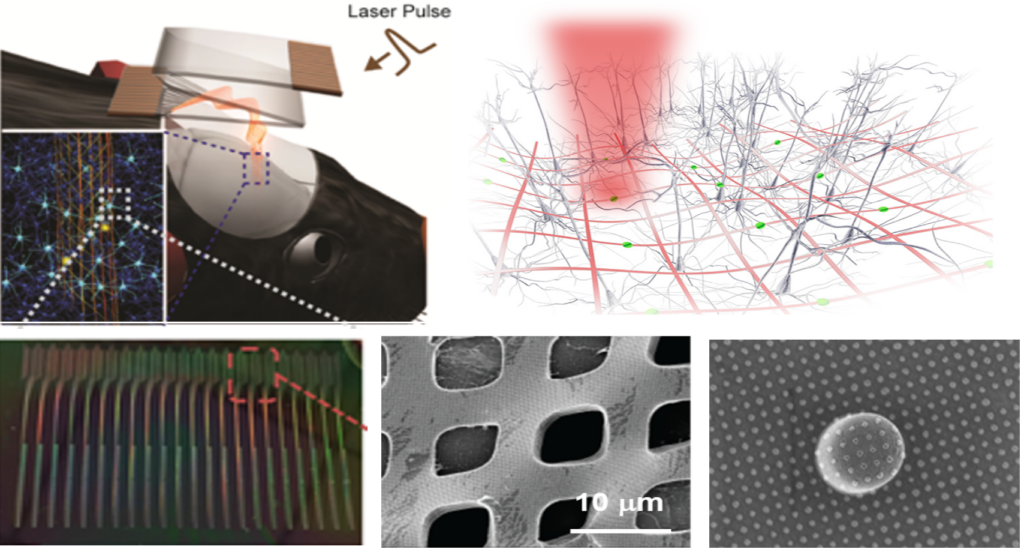Group Leader’s Welcome & Lab Mission
Welcome Message. Welcome! Our lab is dedicated to bridging the bio-nano information gap by developing hybrid optical-electrical nano-bio interfaces that enable real-time molecular insights for proactive healthcare, agricultural applications, and environmental stewardship. We combine micro-/nanofabrication, optical nanocavities, micro-/nanoelectrodes, and machine learning analytics to create multimodal sensing and actuation platforms. These integrated solutions facilitate early disease interception, precision therapeutics, neuromodulation, and field-deployable monitoring—transforming diagnostic and treatment approaches from reactive to proactive.
Dr. Zhou’s Bio Snapshot. Education: Ph.D. in Materials Science & Engineering (Northwestern University, 2012) with Professor Teri W. Odom; Postdoctoral Researcher at Harvard University (Department of Chemistry & Chemical Biology) under Professor Charles M. Lieber. Major Awards: Air Force Young Investigator Program (YIP), Defense University Research Instrumentation Program (DURIP), Commonwealth Health Research Board (CHRB) Award, NCFL Faculty Fellow. Leadership Roles: Associate Professor at Virginia Tech, Director of Virginia Tech’s Micro-/Nanofabrication Cleanroom, focusing on advanced nano-bio interface research and fostering interdisciplinary collaboration, Associate Editor for IEEE Photonics Technology Letters (IEEE Photonics Society), and Associate Editor for npj Biosensing (Springer Nature)
Lab Overview
History & Growth: Founded in 2015, the lab expanded through AFOSR, NSF, NIST, and Wellcome grants, advancing its mission of merging nanophotonic and nanoelectronic technologies for real-time biosensing and actuation. In 2024, Dr. Zhou assumed directorship of the Micro-/Nanofabrication Cleanroom, scaling the lab’s ability to fabricate cutting-edge devices for health, agricultural, and environmental sectors.
Vision Statement: Dr. Wei Zhou’s group engineers Hybrid Optical-Electrical Nano-Bio Interface—integrated platform technology for real-time biosensing and actuation—to address critical needs in health, agricultural, and environmental sectors. Combining hybrid micro-/nanofabrication, optical nanocavities, micro-/nanoelectrodes, and machine learning analytics, we create multimodal nano-bio interfacing devices for continuous biochemical-biophysical monitoring and actuation. These devices enable proactive healthcare through early disease interception and real-time therapeutics, alongside precise neuromodulation and field-deployable environmental and agricultural monitoring. Our ultimate goal is to transform reactive diagnostics and treatments into proactive, personalized, and sustainable solutions by integrating nanophotonics-nanoelectronics breakthroughs with data-driven precision.
Why This Matters
Proactive Health: Early disease detection, infection management, and precision medicine are crucial for improving human health and well-being. Our research aims to develop real-time biosensing technologies that can identify diseases at their earliest stages, enabling prompt and effective treatment. This proactive approach can lead to better patient outcomes and a healthier society.
Environmental Stewardship: Detecting pollutants and pathogens in real-time is essential for ensuring environmental sustainability and resource management. Our lab develops innovative tools and technologies to monitor environmental health, enabling proactive interventions and responsible stewardship for a cleaner, safer planet.
Global Relevance: Our research directly addresses pressing global challenges, including:
— Antibiotic Resistance: Real-time monitoring of bacterial responses to antibiotics can help combat antibiotic resistance.
— Climate Change: Monitoring environmental pollutants and their impact on ecosystems can contribute to mitigating climate change.
— Food Security: Developing sensors for rapid on-site detection of pathogens in agriculture can enhance food safety and security.
